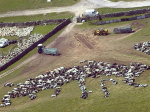Beef+Lamb NZ is gearing up to keep farmers informed about the potential risk of foot and mouth disease (FMD).
Will Halliday, B+LNZ's senior advisor on biosecurity and animal welfare, told Rural News the organisation is working closely with the Ministry for Primary Industries (MPI), DairyNZ, NZ Pork, Federated Farmers, the deer industry and other groups to ensure the messaging across the farm sector is aligned and that everyone singing from the same song sheet.
"As well, we are working with MPI on its planning to determine what a response to FMD might look like should it arrive on our shores."
Halliday says B+LNZ is satisfied with the various measures that MPI has put in place at the border to keep the disease out.
He believes the NZ border is well managed and the risk of FMD getting into the country is low.
Crucial to dealing to any outbreak of FMD, says Halliday, is ensuring that farmers have their NAIT records completely up-to-date. He says this allows authorities to trace the movement of stock and to track down where an infection is likely to be.
Halliday adds that with a fast moving disease such as FMD, having these records from the start will be invaluable.
He adds that the value of good farmer records has been highlighted in the recent M. bovis outbreak.
B+LNZ is also looking at what other measures can be taken, such as the feeding of waste to pigs, which is a major pathway for the disease to get out of control.
"This event is a good reminder for farmers to have a look at their on-farm biosecurity practices and consider who and what is coming on to their farm," Halliday adds. "Why are they there and where they are going and what are they doing?"
He also advises farmers to look up what the symptoms of FMD are and be aware of what to look for, as well as knowing what to do if they see someting out of the ordinary. Halliday adss if a farmer discovers something suspicious, the first port of call should be their vet, who has the expertise and knowledge to deal with any problem. He says it's critical for farmers to have close relationships with their vets.
Halliday adds that it's also important to ensure that all farm staff, and anyone involved in handling livestock, are fully briefed about FMD.
"They should be able to recognise the symptoms and what they need to do if they believe there's a potential outbreak on the farm," he says. "In this situation, vigilance is key."











